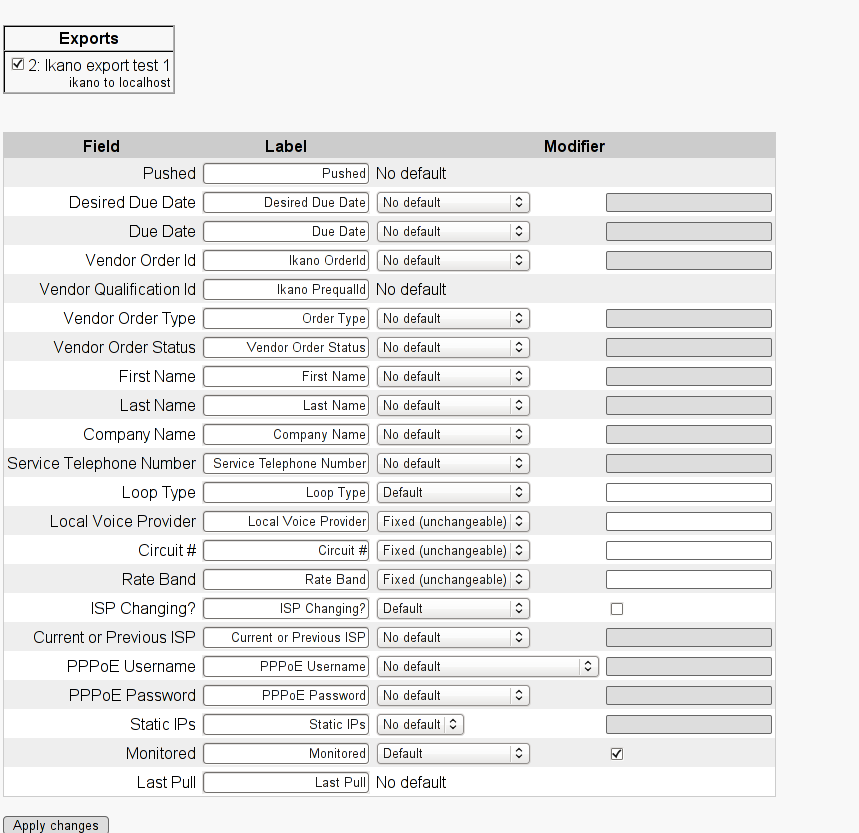Freeside:2.3:Documentation:Administration:svc dsl:ikano
Contents
Introduction
Ikano DSL provisioning and qualifications requires installation of Net::Ikano and then configuration of the exports, services, DSL pull cron job, packages, and config option for qualifications.
Global Configuration
Enable qual-alt_address_format and (unless using prospects for something else) prospect_main-alt_address_format.
USPS validation is extremely useful to have working; if so (unless using prospects for something else) prospect_main-location_required
Employee Groups
Give the "Qualify Service" ACL to the groups which should be allowed to run DSL qualifications.
Exports
Create an ikano export - most fields are obvious on the export add page, except:
- Export Name - note that it's used in several user-visible places, such as on qualifications
- Export Host - not used, may be set to anything
- Check Networks - comma separated list of telco networks to check (refer to Ikano API doc or web interface if you're not sure what these are). Only set this to the telcos you use. Ikano qualifications are slow. Adding extra telco networks to check will result in a performance impact when making each qualification. This field can look similar to "ATT,ATTTAS,VERTAS,VER".
- Debug Mode - generates A LOT of output in the logs - turn it off for production
Services
Create a new svc_dsl and attach your export. No other DSL-pulling/qualifying exports may be attached to this service.
Configure the service similarly to the following screenshot:

DSL pull cron job
freeside-pull-dsl syncs data from Ikano to the svc_dsl. It runs synchronously/non-concurrently, meaning that it works with one svc_dsl at a time. It must be run via a cron job as often as needed to update all monitored DSL orders, but not such that it starts again before all monitored orders were updated. Thus, the frequency will vary depending on each Freeside installation's number of monitored Ikano orders.
Packages
Create one-to-one mappings between each Ikano package you wish to use and each Freeside package as follows:
- In Ikano's web interface, under Subscription Manager, find each package you wish to use and set its "Unique ID" field to a string which is unique across all packages you'll be setting up
- Either edit or add a new Freeside package with at least one Ikano svc_dsl service (see above), and set "Vendor Package Id" beside the Ikano export (see above) to the "Unique ID" from Ikano for the corresponding package
Import Mode
Import Mode may be used in case existing Ikano orders/data need to be imported into Freeside.
- Perform initial setup as per the rest of the documentation above
- Enable the Import Mode export option on the Ikano export
- For each customer having an Ikano order that needs to be imported:
- Order the Freeside package corresponding to the Ikano package,
- Click on the DSL service provisioning, set the Ikano order id and add the service
- Order data will be synced automatically in real-time. Due to the Ikano API, some fields will not be imported when using this process. For example, the Ikano qualification ID and order address will not be imported.
- Disable the Import Mode export option on the Ikano export and do not enable it again in future
IMPORTANT WARNINGS:
- Most data validation is disabled when using Import Mode. Therefore, there is a small possibility that invalid data present on Ikano orders may be imported into Freeside.
- As data is synced automatically from Ikano in Import Mode based solely on the order ID entered, it's important to:
- Order the correct Freeside package which corresponds to the Ikano package
- Set the correct Ikano order ID (matching the customer, package, and service address) when provisioning the DSL service using Import Mode
- Set the correct service address on the package